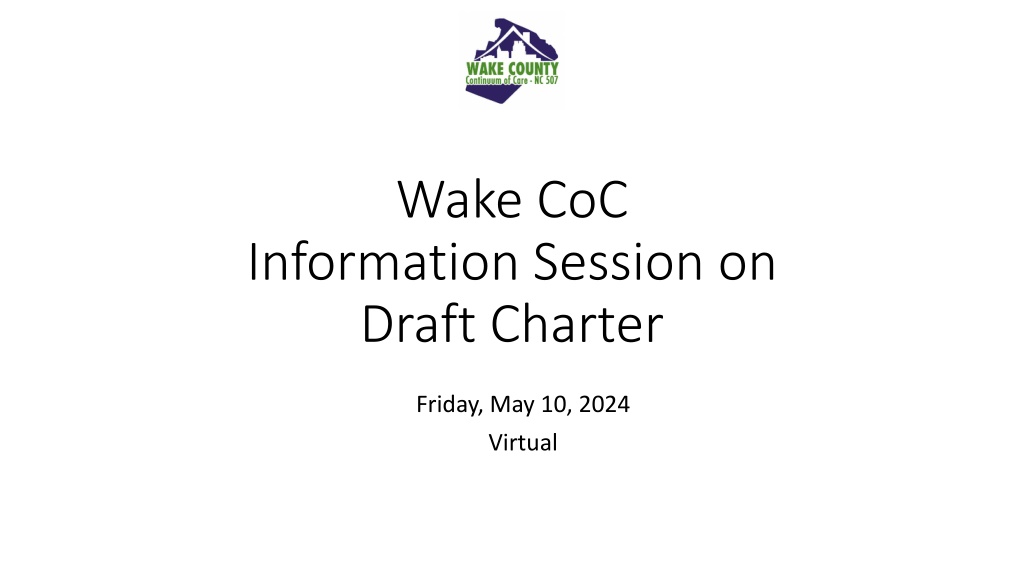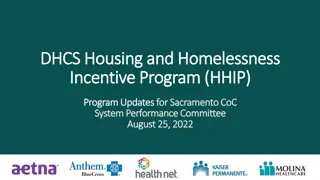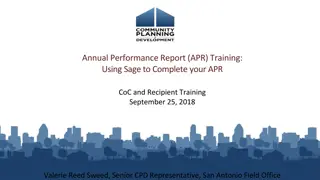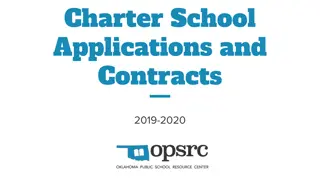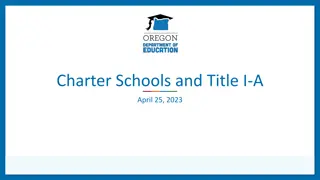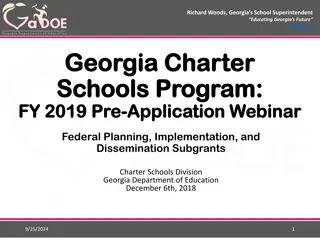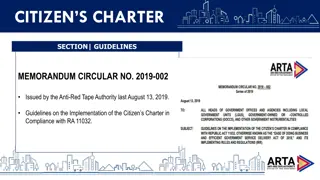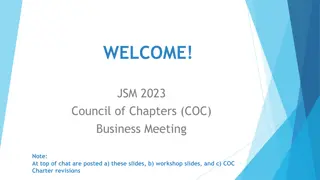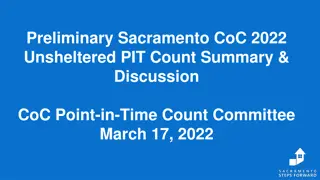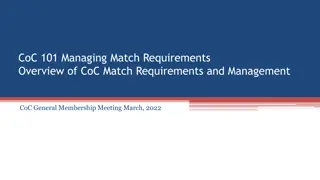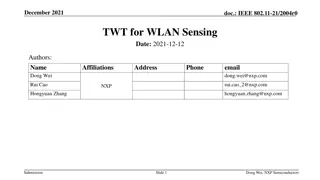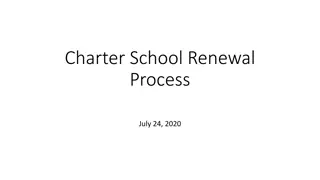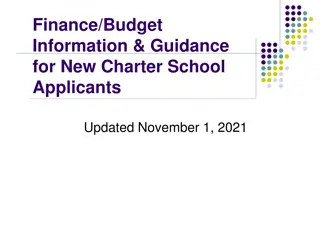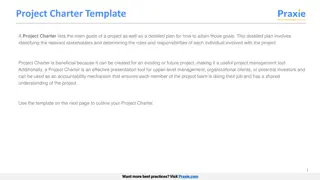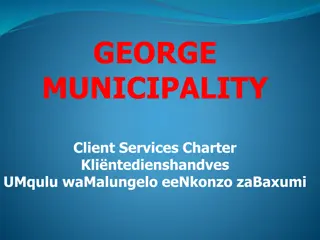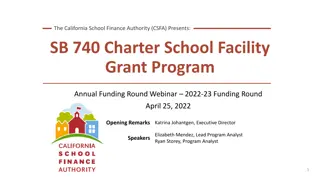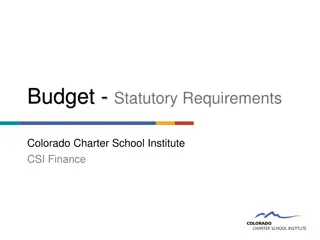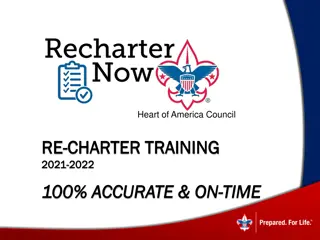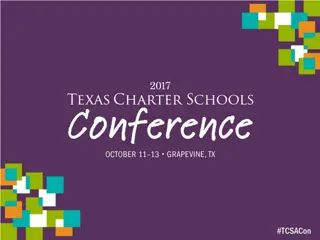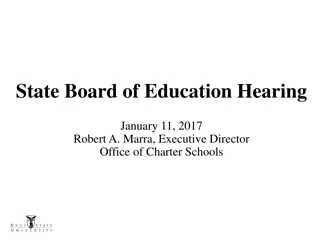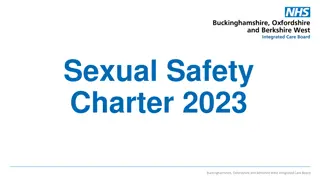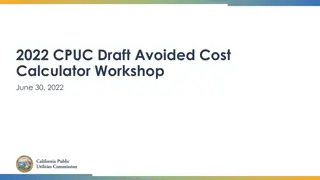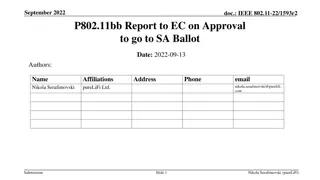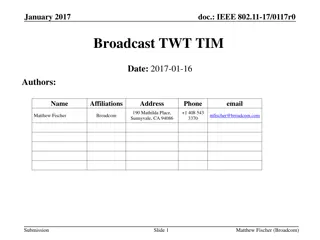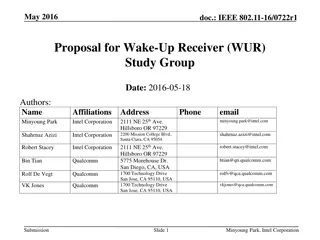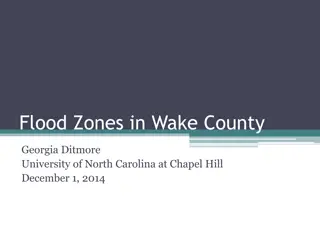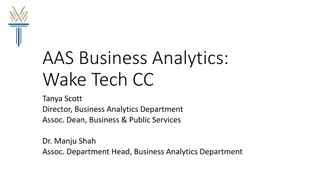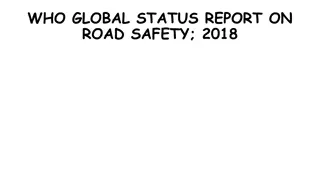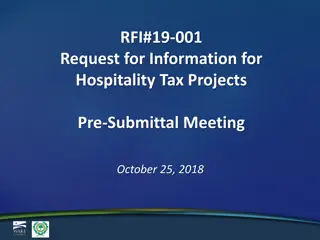Wake CoC Information Session on Draft Charter
Wake CoC is holding a virtual information session on the draft charter discussing reasons for revision, key aspects of the charter, and the establishment of a charter review workgroup by the Governing Board. Key focus areas include refining Governing Board membership for diversity, representation, and clarity on voting and decision-making processes.
Download Presentation

Please find below an Image/Link to download the presentation.
The content on the website is provided AS IS for your information and personal use only. It may not be sold, licensed, or shared on other websites without obtaining consent from the author. Download presentation by click this link. If you encounter any issues during the download, it is possible that the publisher has removed the file from their server.
E N D
Presentation Transcript
Wake CoC Information Session on Draft Charter Friday, May 10, 2024 Virtual
AGENDA AGENDA Why Revise Charter? Review Key Aspects of Draft Charter Comment Period Closes 5.23.24 Questions?
Why Revise Charter? Why Revise Charter?
The Wake CoC Governing Board voted to create a Charter Review workgroup, because: Determining and maintaining membership records was unworkable Voting process was problematic Attendance was tied to voting eligibility Tracking who could vote was difficult Differing membership types made auditing votes difficult Selection/structure/operation of Governing Board was unclear Membership and Governing Board voting was unclear Determining quorum was unclear Lead Agency and Collaborative Applicant Lacked linkage between Charter and MOU s-accountability/evaluation
10 Key Aspects of 10 Key Aspects of Draft Charter Draft Charter
Key Aspect #1 Refine Governing Board membership to ensure diversity and cross-sector representation B. Composition and Leadership. The Governing Board shall consist of at least 15, but no more than 23 members. The Governing Board will continuously monitor its composition to ensure diverse representation from across Wake County geographically, and also concerning race, gender, sexual orientation, immigration status, socio-economic status, and other factors. 1. Permanent Members. The following government agencies shall have the right to appoint one (1) permanent member (for a total of four (4) members) which shall be voted on like all other members of the Governing Board: a) City of Raleigh Emergency Solutions Grant (ESG) Entitlement Jurisdiction b) Wake County Emergency Solutions Grant (ESG) Entitlement Jurisdiction c) Raleigh Housing Authority d) Housing Authority of Wake County 2. Stakeholder Members. Up to Fifteen (15) seats will be filled by representatives from these stakeholders: a) Two (2) Representatives from two (2) of the following regions within Wake County (but outside of Raleigh) (2): Northern Region: Wake Forest and Rolesville Eastern Region: Knightdale, Wendell, and Zebulon Southern Region: Holly Springs, Fuquay-Varina, and Garner Western Region: Apex, Cary, and Morrisville a) Emergency shelter providers (1) b) Prevention, street outreach, or diversion providers (1)
d) Philanthropic partner working to eliminate homelessness (1) e) Faith-based organizations active in ending homelessness (1) f) Workforce development providers (1) g) Landlord or affordable housing developer (1) h) Legal expertise or systemic advocacy (1) i) Healthcare provider (physical, mental health, or substance use) (1 j) Law enforcement (1) k) Business representative (1) l) Wake County Public School System or institute of higher education representative (1) m) Veterans Administration or Survivors of Domestic Violence Provider (1) n) A person with lived experience of homelessness (2). o) A person with other population-specific lived experience: including, but not limited to: formerly incarcerated persons, persons with substance use issues, persons with disabilities, persons with HIV/AIDS, homeless youth, LGBTQ persons, survivors of Domestic Violence, Latino/Hispanic community, veterans, etc. (2). Lived experience is not only the value an individual brings to the Governing Board. Lived experience adds a unique perspective to the other skills that an individual with lived experience brings to the Wake CoC. An individual may represent more than one lived experience or may represent one of these lived experiences while also filling one of the above-designated appointed or elected seats.
Key Aspect #2 Clarifies who is on Executive Committee and the body s role D. Executive Committee. Is composed of the Chair, Vice Chair, Secretary, and Treasurer. 1. Duties. a) Collaborate in developing Governing Board meeting agendas. b) Review and respond to all formal grievances as set forth in the Grievance Policy attached hereto as Exhibit 2. c) Ensure effective communication among the Governing Board, Wake CoC Membership, and community stakeholders.
Key Aspect #3 Establishes a Leadership Council to include the Chair, Vice Chair, Committee Chairs, & designees from HMIS Lead, Collaborative Applicant, & Coordinated Entry VII. Leadership Council The Leadership Council is composed of the Wake CoC Governing Board Chair and Vice Chair; the Chairs of each Standing Committee; and representatives designated by the HMIS Lead, Collaborative Applicant, and Coordinated Entry entity. 1. Duties. a) Ensure that Wake CoC Members, Committees, Workgroups, Collaborative Applicant, HMIS Lead, and other designated lead agencies are fulfilling their responsibilities while maintaining compliance with this Charter, other applicable governing documents, funder requirements, written agreements, performance standards, as well as all applicable statutes and regulations. b) Work with the Executive Committee in setting agendas for Wake CoC Membership meetings. c) In compliance with 24 CFR 578.7(a)(5), coordinate the review of the Wake CoC Charter for compliance with applicable laws and regulations, as well as consistency with the Wake CoC policies, procedures, goals, and priorities. Once this review is complete, the Leadership Council will present proposed Charter amendments to the Wake CoC Governing Board for review and consideration.
Key Aspect #4 Establishes formal membership application process with an annual renewal Annual renewal will help maintain current contact information V. Wake CoC Membership A. Intent. The Wake CoC is made stronger by building a broad and diverse membership. Therefore, Wake CoC Membership is open to any individual or organization residing or conducting business within Wake County that embraces the mission, values, and goals of the Wake CoC. The Wake CoC will actively recruit a broad and diverse membership including, but not limited to persons with lived experience and knowledge of homelessness, nonprofit homeless assistance providers, victim service providers, faith-based organizations working to reduce homelessness, local governments throughout Wake County, businesses, funders, advocates, public housing agencies, school districts, social service providers, mental health and substance use agencies, healthcare providers, universities, affordable housing developers, landlords, and criminal justice providers. B. Application and Renewal. Organizations or individuals may become Wake CoC Members by completing the application posted on the Wake CoC website. To encourage, rather than discourage membership, the application will be short and simple to complete. Each application will be reviewed and acted upon by the Nominations Committee. Each applicant will be notified in writing once their application has been acted upon. An organizational member shall designate one person from that organization who shall have the exclusive right to vote on behalf of said organization (one vote per organization) at Wake CoC Membership meetings. The Wake CoC shall continually recruit new members to ensure that membership generally reflects the demographics of Wake County and is of sufficient size to effectively carry out its mission. Additionally, existing members shall review and/or update their information annually. There is no minimum or maximum size requirement for Wake CoC Membership.
Key Aspect #5 Clarifies designation of individual v. org membership 1. All individual Wake CoC members will have one vote. All member organizations will have one vote. An individual cannot vote both as an individual and on behalf of a member organization. If an organization has multiple departments with distinct missions, each of which desires a vote, then each department must apply to become a distinct organizational member and designate an individual who is eligible to vote on behalf of this member.
Key Aspect #6 Clarifies quorum issue for Membership and Board V. Wake CoC Membership. E. Voting 2. Any item requiring a vote must appear on the official meeting agenda, publicized at least ten (10) calendar days in advance of the meeting. Approval by vote requires a simple majority of the full Wake CoC Membership as of the date an item appears on an official agenda to be voted upon. VI. Wake CoC Governing Board at a meeting is defined as in-person or via telephone/video when available. Votes may also be held and confirmed by the same quorum via email, for time-sensitive situations. K. Quorum. A simple majority of the full Wake CoC Governing Board membership constitutes a quorum. Attendance
Key Aspect #7 Sets out what CoC Membership votes on 3. Items to be voted on by the Wake CoC Membership include but are not limited to: a) Annual updates to the Wake CoC Charter and any exhibits attached thereto. b) All general policies or procedures that apply to the Wake CoC. c) Written agreement designating the Wake CoC Collaborative Applicant. d) Written agreement designating the Wake CoC HMIS Lead. e) Each member of the Governing Board after recommendation by the Nominations Committee. f) Any other written agreement between the Wake CoC and a third party necessary for fulfilling the responsibilities of the Wake CoC as required by applicable federal, state, and local laws and regulations.
Key Aspect #8 Sets out Governing Board role A. Roles and Responsibilities of the Wake CoC Governing Board. To make homelessness rare, brief, and non-recurring, the Board s responsibilities shall include: 1. Engage community leaders to develop and implement comprehensive strategies to reduce and end homelessness in Wake County. 2. Assess and monitor the performance of the Wake CoC, identify gaps, develop and implement strategies to address gaps, and improve the overall Wake CoC performance, including implementation of best practices. 3. Consult with the Collaborative Applicant and HMIS Lead to develop, follow, and update the Governance Charter as needed. 4. Recommend any Charter amendments to the Wake CoC Membership for a vote as they arise. 5. Receive recommendations on the recipient and sub-recipient performance targets appropriate for population and program type, along with performance and outcomes of ESG and Wake CoC programs. 6. Approve the Wake CoC HMIS data privacy plan, data security plan, and data quality plan. 7. Establish priorities that align with local and federal policies for recommending projects for Wake CoC-related grant funding. 8. Coordinate with the Collaborative Applicant on any other funding related to Wake CoC activities or funding. 9. Call meetings of the full Wake CoC membership at least quarterly. 10.Appoint Committees and Workgroups to facilitate the work of the Wake CoC. 11.Review annual work plans submitted by Wake CoC Committees.
Key Aspect #9 Establishes new voting process that can be tracked and audited and allows more time for members to educate themselves and for more members to participate 4. Voting procedure. Once a motion to approve an agenda item has been seconded during a Wake CoC membership meeting, a ballot shall be sent by email to the then-current list of the Wake CoC Membership. The ballot shall contain the following: a) The text of the motion, along with all associated documents needed to evaluate the pending motion. b) Instructions stating that each member shall return said ballot to the following email address:______ containing the member s vote no later than ten (10) business days after the ballot was emailed to the Wake CoC Membership. The results of all Wake CoC membership votes shall be tallied and emailed to the Wake CoC membership along with the draft minutes of the meeting at which the item appeared on the agenda no later than ten (10) business days after the deadline to vote on a particular agenda item expired. The results shall also be posted to the Wake CoC website the same day that the results are emailed to the Wake CoC membership.
Key Aspect #10 Requires standing committees to produce annual work plans to be reviewed by the Wake CoC Governing Board The Funding Review Committee shall submit an Annual Work Plan to the Wake CoC Governing Board no later than December 31st of each year. The Nominations Committee shall submit an Annual Work Plan to the Wake CoC Governing Board no later than December 31st of each year. The Coordinated Entry System Committee shall submit an Annual Work Plan to the Wake CoC Governing Board no later than December 31st of each year. The Data Advisory Committee shall submit an Annual Work Plan to the Wake CoC Governing Board no later than December 31st of each year. The Homeless Emergency Response Committee shall submit an Annual Work Plan to the Wake CoC Governing Board no later than December 31st of each year. The Racial Equity Committee shall submit an Annual Work Plan to the Wake CoC Governing Board no later than December 31st of each year.
Comment Period Closes May 23, 2024 Comment Period Closes May 23, 2024
Next Steps Next Steps
Questions? Questions?
Thank you! Thank you! Reach out: Eric Braun braunrha@ebraun.org
